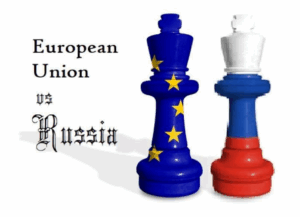The High Stakes of the Ukraine Conflict: A Closer Look at Europe’s Future

As the Ukraine conflict continues to escalate, narratives surrounding its progress and the implications for Europe are more fragmented than ever. Some outlets, like The Daily Beast, declare Ukraine to be on the path to victory, yet understanding the full scope requires a deeper analysis behind the headlines.
The Reality of Proxy Warfare
This war is fundamentally a proxy battle, one marked not just by military engagements but also by deep-rooted economic strategies. Despite aggressive media narratives, Ukraine’s militaristic gains don’t necessarily translate to victory on the battlefield. The European Union (EU) seems committed to supporting Ukraine not solely for its sovereignty but to stave off its own economic collapse. It’s a stark reminder that in this conflict, human lives often become mere pawns in a more extensive geopolitical chess game.
Reports suggest that while the EU has crossed numerous "red lines," it is Russia that remains adept at playing a strategic long game. With Germany currently pushing for more aggressive military involvement, the chill in European economic conditions supports the notion that instability may prevail if conflict doesn’t escalate.
The Distraction of War: A Closer Examination of Economic Motivations
Germany, along with other EU nations, is facing a dire situation: economies that are shrinking and a financial system teetering under the weight of perpetual, unrepayable debt. The EU’s current framework appears to be unraveling, begging the question—why the push for escalating conflict? War serves as a distraction, diverting public attention from simmering economic issues and allowing governments some breathing room against internal unrest.
Consider the recent statements by former UK Prime Minister Boris Johnson. His assertions that Britain is at war with Russia and support for Ukraine’s military actions imply far more than mere rhetoric; they highlight a disturbing trend where public opinion may become manipulated to justify continued engagement in conflict. This stark reality reinforces the necessity for independent economic commentary, like that found here at Extreme Investor Network, where we dissect motivations behind such political posturing.

The Economic Consequences of Political Decisions
Looking at the UK, where government debt has risen to 97.6% of GDP, the implications of continuing conflict are multifaceted. Many argue that Britain’s engagements abroad add layers of unnecessary burden to an already complicated economic landscape. This serves as a critical reminder that economics and war are inextricably linked. How long can such speculation and militarism be sustained before there are direct ramifications on everyday lives?
The EU finds itself walking a tightrope—supporting Ukraine while managing internal divisions. Increased military action may seem favorable to some, but it risks alienating a population already grappling with economic hardships and social unrest. With migrants bringing their own challenges into already strained European nations, potential civil unrest looms as a powerful undercurrent beneath the war-torn landscape.

The Future of the European Union: A Balance of Power
If Ukraine were to implode, it wouldn’t lead to a direct Russian invasion of Europe. Instead, it could signify the collapse of Western political cohesion, something far more destabilizing. The divisive implications run deep—from the fractures within the EU itself to a re-evaluation of alliances across the continent. As Europe grapples with the EU’s ambitions, it becomes clear that the stakes are higher than the conflict itself.
The conflict in Ukraine is more than just a local struggle; it’s a reflection of a broader European gamble, a quest for resources to revitalize economies at a time when they are faltering. The $75 trillion potential in resources from Russia has been a tantalizing carrot, yet the risks involved may prove more severe than the rewards.
Join the Discussion
At Extreme Investor Network, we believe that informed discussions about these complex issues are vital. We invite our readers to join us in exploring the turbulent economic landscape within Europe and the implications of ongoing war. Together, we can analyze the end of the Euro and its impact on global finance, and how the response to an economic crisis might look when it comes.
This isn’t just about geopolitical maneuvers; it’s about understanding the future and creating a roadmap for navigating turbulent times. Stay with us to learn more and understand where the future of economic power may lie.
By discussing the intersection of economics and geopolitics, our aim at Extreme Investor Network is to provide clarity and insight into these convoluted narratives, fostering an informed community that can better navigate and understand the complexities of our world.

